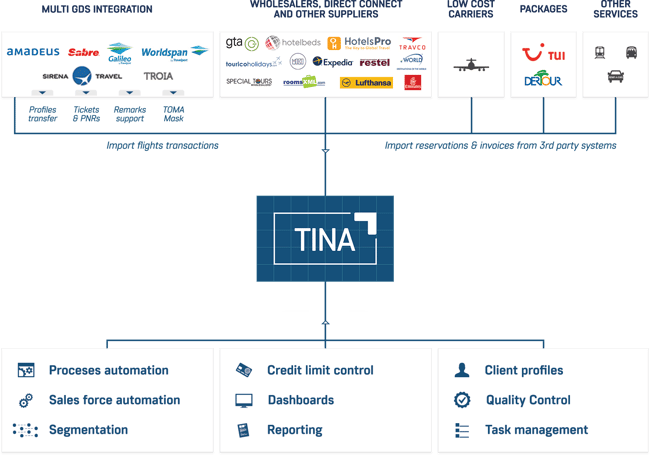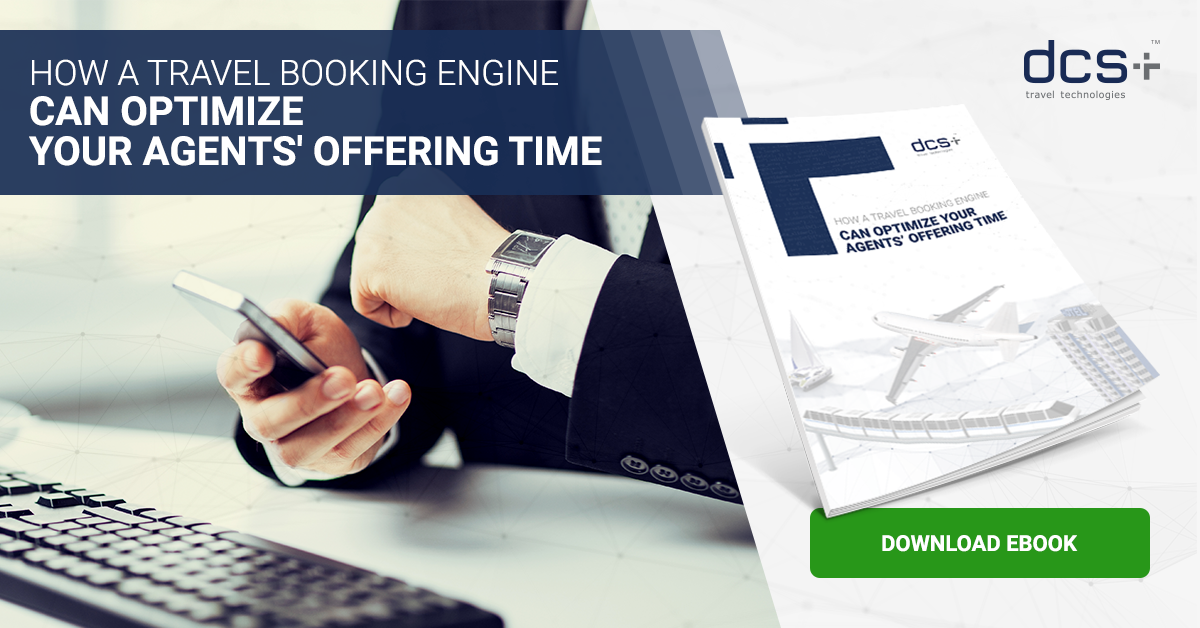Brand It: Why Travel Companies Need a Document Template Manager
By Nick Ostdick on Oct 11, 2016 11:07:50 AM

For many customers, the look, feel, and vibe of a company’s branding can be just as influential in  whether they work with said company as the products and services themselves. As such, it’s important for these companies - especially companies within the travel industry, many of which use brand management and image as a chief selling point - to ensure their brand is uniform and cohesive across a number of different platforms, including offers, vouchers, receipts, and other forms of documentation.
whether they work with said company as the products and services themselves. As such, it’s important for these companies - especially companies within the travel industry, many of which use brand management and image as a chief selling point - to ensure their brand is uniform and cohesive across a number of different platforms, including offers, vouchers, receipts, and other forms of documentation.
But the problem for many travel agencies and travel management companies is that many booking engines and other ERP systems lack the capacity for those within the company to manage their document templates. These templates often times have to be adjusted, modified, or managed by external developers, which is costly, time-consuming, and inefficient, especially when it comes to creating specifically tailored documents for a number of different applications.
Whether a travel agency is creating documentation for a supplier, partner, or customer, each template must be at once uniform with a travel agency’s overall branding and image, yet differentiated enough to meet the demands of the receiver. A document template manager - which is often a part of the overall functionality of more powerful booking engines - provides travel agencies with the flexibility, ease, and convenience to create and modify documents to their needs with little investment in time and resources.
To help further illustrate the need for a document template manager, here are three scenarios in which travel agencies can leverage a template manager to enhance their efficiency, productivity, and customer relations management.
Example #1 (The Theory of Multiples): Travel Agency A has generated an offer to help drive bookings to a destination of great interest based on previous demand and future forecasting. The travel agency must then create a series of vouchers for customers to redeem this offer. The problem? What if these vouchers need to be designed with slight variations in products, services, and pricing based on supplier availability and target audience. Without a document template manager, Travel Agency A would have to coordinate with a developer or external partner to create several different vouchers. However, with a document template manager, agents can easily modify vouchers within the booking engine. This not only streamlines the document management process, but it empowers agents to become more creative and collaborative with the look and feel of these vouchers.
Example #2 (Customer-Facing Documents): Today’s travel agencies engage in both front and back-office tasks in order to provide customers the best products and services to drive bookings and retain customers. But balancing both the front and back-office can be tricky when it comes to the documents necessary to facilitate business. For example, the documents needed for supplier invoices are quite different than those designed for customers to redeem hotel offers even though both must retain the travel agency’s branding and image.
A document template manager allows travel agencies to create, edit, and manage documents for the back-office, but also for customer-facing operations without having to work with an external partner or create two very different sets of projects. Agents can - with little training - work within a booking engine to quickly generate vouchers, coupons, and other documents to help travelers secure deals and complete bookings with little or no negative impact on an agent’s overall efficiency and productivity.
Example #3 (Different Invoices for Different Reasons): Suppliers. Resellers. Other partners within a travel agency’s value chain. Travel agencies are constantly invoicing different players within the travel industry each one with different needs and demands for how invoices are submitted, formatted, and processed. Agencies that use a document template manager can create, edit, store, and replicate invoices catered specifically to the end user. This not only makes it easy for travel agencies to organize and structure their invoicing strategies, but it also provides agents with the flexibility and responsiveness to create invoices for new partners with little lead time and cost. This level of agility is critical to driving long-term business relationships in which a travel agency is viewed as a nimble partner in a global, competitive industry.
It may not be at the forefront of many travel agencies, but as you can see a document template manager is actually a key driver in helping agencies become more lean, transparent, and flexible when it comes to creating documents for internal and external distribution. Without resorting to developers or external partners, travel agencies will reduce costs, increase efficiency, and realize a competitive advantage in managing their documents in-house within a powerful booking engine.
- travel technology (60)
- Travel Industry (49)
- travel agency (31)
- travel erp (31)
- travel trends (28)
- travel booking system (23)
- TINA (21)
- travel company (19)
- Tour Operator (18)
- Product updates (17)
- Travel Management Company (17)
- AIDA (15)
- TBS (15)
- Business Travel (14)
- dcs plus news (14)
- tour operator solution (14)
- travel website (14)
- travel erp system (13)
- Mobile App (12)
- Travel App (12)
- mid back office solution (12)
- trends (12)
- Corporate Travel (11)
- Industry Events (11)
- Mobile Technology (11)
- TMC (11)
- travel agents (11)
- erp (10)
- erp system (10)
- Tour Operators (9)
- Travel booking engines (9)
- dcs plus (9)
- online travel agency (9)
- travel agent (9)
- Mobile Bookings (8)
- travel (8)
- travel agencies (8)
- 2017 (7)
- Business Traveler (7)
- Mobile Travel (7)
- travel business (7)
- travel software (7)
- Digital Technology (6)
- Insider (6)
- Millennials (6)
- Online booking systems (6)
- Travel Management Companies (6)
- process automation (6)
- travel companies (6)
- Big Data (5)
- Partners interviews (5)
- Tour Operator Software (5)
- customer retention (5)
- travel agency technology (5)
- Booking engines (4)
- CSBT (4)
- Mobile Device (4)
- Mobile travel apps (4)
- OTAs (4)
- Static databases (4)
- Tour Companies (4)
- Travel Policy (4)
- Travel booking systems (4)
- Travel suppliers (4)
- back office automation (4)
- corporate self booking tool (4)
- millennial travelers (4)
- online travel (4)
- responsive travel website (4)
- technology (4)
- travel website conversion (4)
- 2016 (3)
- Content mapping (3)
- Databases (3)
- Demographics (3)
- Food and Adventure Tourism (3)
- Mobile Apps (3)
- Travel Distribution Channels (3)
- Travel Management Software (3)
- Travel customers (3)
- Travel history (3)
- anniversary (3)
- automated processes (3)
- content matching (3)
- global travel industry (3)
- social media (3)
- travel agency workflow (3)
- travel back office (3)
- travel marketing (3)
- travel process automation (3)
- AI in travel (2)
- Advanced Booking Systems (2)
- B2B Travel Resellers (2)
- Bleisure (2)
- Branding (2)
- Business Process Automation (2)
- Business Travelers (2)
- Customer engagement (2)
- Financial Reporting (2)
- Food Tourism (2)
- Inbound Marketing (2)
- Infographic (2)
- Leisure Travel (2)
- Saas (2)
- Templates (2)
- Travel Costs (2)
- Travel bookings (2)
- Travel start-up (2)
- Travel website abandonment (2)
- WTM 2016 (2)
- abandoned travel bookings (2)
- engagement marketing (2)
- internet booking engine (2)
- millennial traveler (2)
- new travel company (2)
- office (2)
- online reputation management (2)
- online travel reviews (2)
- reporting (2)
- software (2)
- start-up tips (2)
- travel agency management (2)
- travel agency website (2)
- travel experience (2)
- travel mobile app (2)
- travel packages (2)
- travel reservation system (2)
- travel system (2)
- travelers (2)
- web-based travel erp (2)
- 2020 (1)
- 360 Customer View (1)
- Advanced Accommodation Contract Management (1)
- Adventure travelers (1)
- Apps (1)
- B2B Reseller (1)
- B2B Resellers (1)
- B2C (1)
- BI Reporting (1)
- Budget traveler (1)
- Cancellations (1)
- Chat (1)
- Chinese millennial (1)
- Cloud (1)
- Cognitive computing (1)
- Comparison shopping (1)
- Conference (1)
- Contact matching (1)
- Content (1)
- Cruise (1)
- Culinary traveler (1)
- Customer relations (1)
- Digital Innovation (1)
- Digital Natives (1)
- Documents (1)
- Emerging market travelers (1)
- Emerging markets (1)
- Errors (1)
- Experimental travel (1)
- Financial Dashboard (1)
- Import rates (1)
- Instant messaging (1)
- Integrate with Accounting Software (1)
- Internet (1)
- Luxury traveler (1)
- Mobile Transaction (1)
- Mobile payments (1)
- NDC distribution (1)
- Operational Reporting (1)
- Reseller networks (1)
- Resellers (1)
- Response (1)
- Subagents Network (1)
- TINA Academy (1)
- TTE (1)
- Travel Reseller Network (1)
- Travel Revenue Management (1)
- Travel booking problems (1)
- Travel finance reporting (1)
- Travel stats (1)
- WTM (1)
- abandonment (1)
- accomodations (1)
- advanced reporting (1)
- airline direct connect technology (1)
- ancillary services (1)
- cloud computing (1)
- collection (1)
- collection challenges (1)
- common data model (1)
- conversion rates (1)
- corporate mobile app (1)
- cost control (1)
- credo ventures capital invests in dcs plus (1)
- customer reviews (1)
- data analysis (1)
- dcs plus credo investment (1)
- dcs plus credo ventures (1)
- deloitte technology fast 500 EMEA (1)
- digital transformation (1)
- e-invoicing KSA (1)
- email marketing (1)
- email marketing for OTAs (1)
- erp e-invoicing (1)
- lost travel bookings (1)
- modern travel agencies (1)
- networks (1)
- new features (1)
- offers (1)
- online customer review (1)
- online reputation (1)
- online travel agencies (1)
- risk management (1)
- sales (1)
- senior travelers (1)
- shopping baskets (1)
- shopping carts (1)
- social network (1)
- standardized processes (1)
- static content (1)
- travel SaaS (1)
- travel account services (1)
- travel agency customers (1)
- travel agency profitability (1)
- travel analytics (1)
- travel blog (1)
- travel planning (1)
- travel reviews (1)
- travel shopping carts (1)
- travel software for agencies (1)
- travel software system (1)
- travel technology europe (1)
- travlist smart mobile app (1)
- trend (1)
- trusted adviser (1)
- trusted advisor (1)
- upsell functionality (1)
- vouchers (1)
- website traffic (1)
- zatca (1)
Subscribe by email
You May Also Like
These Related Stories

TINA is ZATCA certified software for Saudi Arabia's market

Bon Appetit: The Rise of the Culinary Traveler


No Comments Yet
Let us know what you think